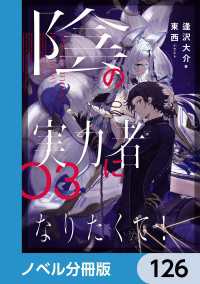- ホーム
- > 洋書
- > 英文書
- > Literary Criticism
Full Description
This volume is the product of new research on Conrad's engagement with the arts during his lifetime. Beginning with nineteenth-century Polish landscape painting and Polish theatre, the essays move through music and the performing arts during Conrad's time in Marseilles; the opera Conrad encountered in Australia; and Conrad's later-life knowledge of recent and contemporary classical music. Subsequent essays demonstrate his familiarity with contemporary visual art (particularly through his friendships with various artists in London); his interest in dance; and his active involvement in contemporary theatre and screen-writing. The volume concludes with a discussion of Conrad's art as a novelist and playwright, his 'theatrical imagination', in relation to developments in theatre theory of the time.
Contents
List of Illustrations
Acknowledgements
A Note on Texts and Abbreviations
Introduction: Joseph Conrad and the Arts of His Time
Robert Hampson
1. The 'Familiar Landscape' in Conrad's Polish Texts
Marek Pacukiewicz
2. Joseph Conrad, Apollo Nałęcz-Korzeniowski and Polish Drama in the Nineteenth Century
Karol Samsel
3. Conrad, Music and the Performing Arts in Marseilles
Helen Chambers
4. Conrad and Australia: Operatic Instability and 'The Planter of Malata'
James Ward
5. Revisiting Jean-Aubry's 'Joseph Conrad and Music' (1924)
Erik Levi
6. A Seeing Eye: Conrad and the Visual Arts
Robert Hampson
7. Conrad and Dance: From Music Hall to Modernism
Susan Jones
8. 'Un genre que Vs étonnera': Conrad Writing for the Cinema
Katherine Isobel Baxter
9: Conrad, the English Literary Theatre and Grand-Guignol
Richard J. Hand
10. 'A Theatrical Imagination': Conrad's Fiction and the Arts of the Modernist Stage
Mark Deggan
Notes on Contributors
Index








